| Srl | Item |
| 1 |
ID:
106959
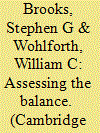

|
|
|
|
|
| Publication |
2011.
|
| Summary/Abstract |
Save for the single issue of balance of power theory's relevance to the current system, where we and some of our critics are in real disagreement (and they are wrong), every aspect of this symposium has been highly productive. Our critics do not directly dispute the proposition that a rapid end of a single superpower world is extremely unlikely. They generally endorsed our core finding that the systemic constraints featured in IR scholarship are largely inoperative with respect to a United States that remains the sole superpower. These essays are consequently devoted mainly to discussing the implications of our findings and the future research agenda. In particular, they developed serious challenges to the idea of US led institutional revisionism, generated new ideas about both systemic and non-systemic constraints, and suggested potentially powerful theories about constraints on other states besides the United States.
|
|
|
|
|
|
|
|
|
|
|
|
|
|
|
|
| 2 |
ID:
106962
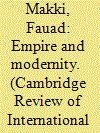

|
|
|
|
|
| Publication |
2011.
|
| Summary/Abstract |
Conventional accounts of modern state-formation either underplay its contradictory and variegated character or neglect its international dimensions. Against these approaches, alternative theories of state-formation have emerged centred on the constitutive significance of intersocietal relations and differential temporalities. This article develops the latter approaches in relation to the Ethiopian state. Contrary to widespread assumptions of Ethiopia's political insularity, it suggests that at three crucial turning points geopolitical exigencies provided the critical impetus for the political and cultural reconstitution of the state. Late nineteenth century European colonial encroachment triggered a reaction in the form of an Ethiopian imperial expansion to rival them. And the political shock of Italian occupation 40 years later provoked a concurrent project of dynastic centralization and official nationalism in the post-restoration period. But precisely because divine monarchy and nationalism are antithetical orders by virtue of their opposed principles of sovereignty, the attempt to conjoin them generated deep social and cultural contradictions that erupted in two successive revolutions that were internationally overdetermined and resulted in a profound reconstitution of the Ethiopian state.
|
|
|
|
|
|
|
|
|
|
|
|
|
|
|
|
| 3 |
ID:
106960
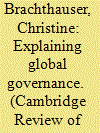

|
|
|
|
|
| Publication |
2011.
|
| Summary/Abstract |
As patterns of global governance have undergone significant changes over time, there is a need for new theoretical concepts that are less oriented towards formal hierarchies and give more emphasis to social processes. A framework, however, that takes account of complex interactions and tangling relations bears the danger of losing analytical power. The article addresses the question of the extent to which complexity theory can overcome this problem by combining scientific rigour with contextual sensitivity. A dynamic mechanistic approach is explored that addresses the underlying processes that generate new collective patterns based on changed actor constellations and relational orders. An activator-inhibitor interaction model is introduced as a framework for analysing the multi-level processes that drive international change, using the example of climate protection. Global governance is theorized as it grows within the system fleshing out a new logic of collective action based on decentralization and clustering.
|
|
|
|
|
|
|
|
|
|
|
|
|
|
|
|
| 4 |
ID:
106956
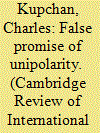

|
|
|
|
|
| Publication |
2011.
|
| Summary/Abstract |
In World out of balance, Stephen Brooks and William Wohlforth make a valuable contribution to ongoing debate about the systemic effects of unipolarity and the durability of US primacy. They are correct that unipolarity engenders systemic stability because the power gap between the United States and potential rivals forestalls military balancing. However, Brooks and Wohlforth underweight other means through which major states are resisting US power and they fail to appreciate that the systemic characteristics of unipolarity may change in relatively short order.
|
|
|
|
|
|
|
|
|
|
|
|
|
|
|
|
| 5 |
ID:
106957


|
|
|
|
|
| Publication |
2011.
|
| Summary/Abstract |
The standard view of contemporary unipolar politics is that systemic constraints impede the translation of American power capabilities into influence over security outcomes, rendering the United States (US) much less capable than its material capabilities imply. Challenging this logic, William Wohlforth and Stephen Brooks argue that systemic constraints under unipolarity are largely inoperative with respect to the security policies of the unipolar power. Indeed, the US is uniquely positioned in today's world to convert its enormous capability advantages into influence and usable power. While World out of balance is a masterwork of logical and rigorous argumentation, Brooks and Wohlforth, in their exclusive focus on the hegemon and its policies, do not attempt to offer a general theory of unipolarity. Thus, they do not consider the possibility that unipolarity does not constrain any actors or the issue of system change. This essay advances two routes out of unipolarity: (1) a 'delegitimation' phase followed by regular balancing behavior and (2) a sudden and dramatic shift from unipolarity to multipolarity brought on by an unforeseen US collapse.
|
|
|
|
|
|
|
|
|
|
|
|
|
|
|
|
| 6 |
ID:
106953
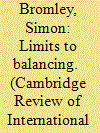

|
|
|
|
|
| Publication |
2011.
|
| Summary/Abstract |
This article explores the major contribution of Brooks and Wohlforth's World out of balance to debate about the role of American primacy and power in contemporary international affairs. It argues that these authors make a major contribution to our understanding of the present international order but that some key questions about the effectiveness of US primacy remain unaddressed and require different questions and considerations to be debated.
|
|
|
|
|
|
|
|
|
|
|
|
|
|
|
|
| 7 |
ID:
106958
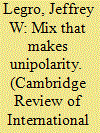

|
|
|
|
|
| Publication |
2011.
|
| Summary/Abstract |
The nature of a global arena dominated by one great power remains a critical subject for understanding international relations. Brooks and Wohlforth's recent book makes an important contribution by arguing that unipolarity poses few constraints to the hegemon and that the United States today should pursue a policy of primacy. The puzzle is that the United States has mostly resisted a primacy policy since becoming the sole superpower, and when it has done so, has often been less successful than the promise of its power advantage. Explaining this puzzle requires building on 'the no constraint' approach to develop a positive theory based on hegemonic purpose, a reformulated notion of constraints, and how purpose and constraints interact to shape outcomes. This reformulation suggests that any American strategy that looks like 'primacy' is unlikely to succeed.
|
|
|
|
|
|
|
|
|
|
|
|
|
|
|
|
| 8 |
ID:
106961
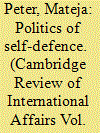

|
|
|
|
|
| Publication |
2011.
|
| Summary/Abstract |
This contribution considers an alternative approach to the research on the use of force, a field that has been largely dominated by international legal scholars. I argue for application of an evolutionary approach to international (legal) norms, one that complements current legal approaches and moves the discussion of norms beyond their dichotomous legal/illegal understanding. This kind of research highlights the role of politics in international law and allows us to determine factors influencing dissemination of international norms. Through a study of seven post-Second World War cases, I trace the development of both narrow and expanded notion of preemptive self-defence and conclude that while ascertaining legality of specific actions is vital for understanding established international law, one cannot talk about radical breaks in development of the law on the use of force. The expanded concept is in fact a product of the evolution of (societal) norms on self-defence and an accumulation of previous successful challenges in metanorms on the use of force.
|
|
|
|
|
|
|
|
|
|
|
|
|
|
|
|
| 9 |
ID:
106955
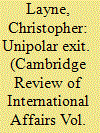

|
|
|
|
|
| Publication |
2011.
|
| Summary/Abstract |
In this article I show that the unipolar era already is drawing to a close. Three main drivers explain the impending end of the Pax Americana. First, the rise of new great powers-especially China-is transforming the international system from unipolarity to multipolarity. Second, the United States is becoming the poster child for strategic over-extension, or as Paul Kennedy dubbed it, imperial overstretch. Third, the United States' relative economic power is declining, and mounting US fiscal problems and the dollar's increasingly problematic role as the international financial system's reserve currency are undermining US hegemony. After examining how these trends undermine the argument for 'unipolar stability', I conclude by arguing that over the next two decades the Pax Americana's end presages dramatic changes in international politics.
|
|
|
|
|
|
|
|
|
|
|
|
|
|
|
|
| 10 |
ID:
106952


|
|
|
|
|
| Publication |
2011.
|
| Summary/Abstract |
This short comment seeks to clarify what unipolar politics as usual is, and how it differs from politics as usual under alternative systemic conditions, especially bipolarity. This is an assessment 'from within', accepting Brooks and Wohlforth's description of unipolar politics as well as their central premises that America's lonely superpower status faces no immediate threat and that there is little evidence that powerful states are actively seeking to overthrow the current unipolar system. I suggest that a comparative assessment of how alternative distributions of power create different incentive structures for states yields different conclusions and policy prescriptions than those advanced by Brooks and Wohlforth. Most notably, Brooks and Wohlforth do not fully appreciate how the 'unipolar politics as usual' that they describe provides states with few incentives to cooperate with their policy prescription that the US reshape the world's institutional architecture.
|
|
|
|
|
|
|
|
|
|
|
|
|
|
|
|
| 11 |
ID:
106954


|
|
|
|
|
| Publication |
2011.
|
| Summary/Abstract |
This article first argues that states have not balanced against US unipolar power because the potential balancers do not view the United States as a major threat, because they believe it has benign security-seeking motives, at least with regard to other major powers. This explanation runs counter to the Brooks-Wohlforth argument, which holds that states are not balancing because the magnitude of the United States' power advantage makes balancing essentially infeasible. The second part of the paper challenges the conventional wisdom on the benefits of unipolarity, arguing that the benefits the United States derives from unipolarity are generally overrated. More specifically, US security need not be significantly reduced by growth in China's economy that supports a return to bipolarity.
|
|
|
|
|
|
|
|
|
|
|
|
|
|
|
|